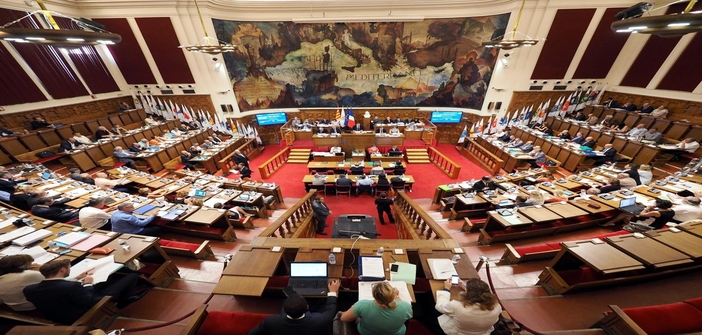Debate on the budget orientation for 2019, housing, utilization of local infrastructures, and education.
These were the main issues on the agenda yesterday at the Nice Côte d’Azur Metropolitan Council meeting at the Mediterranean University Center.
At the outset of this third-quarter 2018 Metropolitan Council meeting, Christian Estrosi, President of the Metropolis and Mayor of Nice, reminded everyone that last year’s goals set with the State were achieved:
- priority to investment in each municipality, with €140 million per year.
- maintaining management efforts within the financial contract framework.
- reducing taxes to increase residents’ purchasing power.
Since 2009, the Metropolis has spent over €2.4 billion on equipment expenditures, more than €240 million annually. The Council has announced that it will continue in this direction by dedicating more than one billion euros from 2018-2020, €140 million annually from the main budget, for investments in our municipalities.
“Attractiveness is conditioned by our ability to offer essential infrastructures for the emergence of a dynamic ecosystem throughout the metropolitan territory,” stated Christian Estrosi. “Our proactive policy is undertaken while maintaining the lowest possible tax level,” he added. Consolidation has resulted in permanent savings of €32 million compared to expenditures observed in 2009. “Within the framework of the financial contract, we will continue these management efforts in 2019 and 2020.”
The President of the Metropolitan Council and Mayor of Nice also specified that he would restore purchasing power to fellow citizens by lowering taxes. “These efforts have allowed us to decrease the household waste collection tax rate (TEOM) by one point in 2018, and we are in a position to reduce this rate by another point in 2019.”
“It’s a reduction forced by the Auchan jurisprudence*. That’s why, for the past two years, the TEOM has decreased,” replied Patrick Allemand, president of the socialist-ecologist group.
The opposition returned to a key point of their criticism of the metropolitan budget: debt. Citing rising figures, over €1.5 billion in 2019, they noted that the alert threshold (12 years) set by the Court of Auditors was exceeded despite the new property tax, which generated nearly €70 million in tax revenue.
Christian Estrosi rejected this interpretation, “an alert threshold does not mean being placed under guardianship but indicates a critical situation,” and then retorted, “the administration confirms that we will be at 9.4 years.”
On this point, Marie-Christine Arnautu (RN) intervened to request revisiting the decision – already made – to sell shares (keeping 1% to remain at the decision-making table) of the Nice Airport Management Company, sold by the State to the Atlantia company (Benetton Group), which manages the Rome airport.
Investment, deficit, debt, and debt reduction capacity, the numbers game never stops, and everyone interprets it in the way they see fit!
Two other points of the session are worth noting:
(i) the Metropolis will support the University Côte d’Azur’s (UCA) candidacy for labeling within the Interdisciplinary Institutes of Artificial Intelligence (3IA) network supported by the Inria Sophia Antipolis center.
(ii) the State has designated the Metropolis as one of the 24 “accelerated implementation territories of the Housing First plan.” This administrative label simply means that the State will allocate credits to provide solutions for people concerned (without stable housing or at risk of disruption) to return to housing and thereby ease the growing saturation of emergency accommodations. An action plan is to accompany this measure.
The next public session is scheduled for November 8. It will be primarily dedicated to the theme of ecology.
Metropolitan counselor Fabrice Decoupigny, who symbolically handed over a glass bottle of “Nice water” to President Estrosi yesterday as part of an action denouncing the use of non-biodegradable plastics, will surely offer us a noteworthy performance. We are preparing for it…


